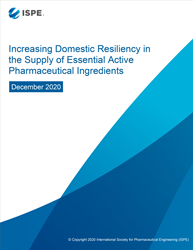
This partnership aligns with ISPE’s mission to support the international pharmaceutical industry and multiple programs we actively lead, including the Drug Shortages Initiative, Advancing Pharmaceutical Quality (APQ), Continuous Manufacturing, and Regulatory Quality Harmonization (RQHC).
NORTH BETHESDA, Md. (PRWEB)
December 17, 2020
The International Society for Pharmaceutical Engineering (ISPE) announced their participation in the Department of the Air Force Acquisition COVID-19 Task Force (DAF ACT) to advise Regulatory, Technical, and Workforce elements favorable to creating a more robust and sustainable domestic pharmaceutical manufacturing base for Active Pharmaceutical Ingredients (APIs).
APIs are the therapeutic substances in finished pharmaceutical products that directly affect the diagnosis, cure, mitigation, treatment, or prevention of disease or physiological functions. The pharmaceutical industry supply chain has evolved to be truly global, with finished pharmaceutical products being manufactured using globally secured APIs. During the COVID-19 crisis, border closures and other logistical challenges revealed supply chain vulnerabilities threatening the global supply and availability of APIs and putting patients at risk in those countries unable to secure supply.
With its vision to solve complex industry problems, ISPE was invited to advise the task force on opportunities to restore a robust and sustainable manufacturing base for critical medicines in the United States. The findings identified in the report are applicable worldwide as nations look for opportunities to ensure a reliable supply of critical medicines for their patient populations. ISPE’s leadership in the prevention of drug shortages and its extensive subject matter expertise within their volunteer networks uniquely positions the Society to support this initiative and others as they emerge worldwide.
“The objective of this partnership aligns with ISPE’s mission to support the international pharmaceutical industry and multiple programs we actively lead, which includes the Drug Shortages Initiative, Advancing Pharmaceutical Quality (APQ), Continuous Manufacturing, and Regulatory Quality Harmonization (RQHC),” said Thomas Hartman, ISPE President and CEO. “We truly appreciate the opportunity to contribute to the DAF ACT Team and look forward to the successful outcome of this program.”
Under this partnership, ISPE assembled a task team of subject matter experts with in-depth knowledge in engineering, manufacturing, regulatory and compliance, environmental health & safety (EHS), analytical, and supply chain management. ISPE addressed challenges in these areas in the report “Increasing Domestic Resiliency in the Supply of Essential Active Pharmaceutical Ingredients”.
Published in December 2020, the report lays out technical, regulatory, and workforce changes that stakeholders in any country or region could consider to reduce the risks of API shortages to meet demands for essential medicines.
The ISPE report is available at ISPE.org/Initiatives/Regulatory.
About ISPE
The International Society for Pharmaceutical Engineering (ISPE) is a not-for-profit association serving its Members through leading scientific, technical, and regulatory advancement across the entire pharmaceutical lifecycle. The 18,000+ Members of ISPE are building solutions in the development and manufacture of safe, effective pharmaceutical and biologic medicines, and medical delivery devices in more than 90 countries around the world. Founded in 1980, ISPE has its worldwide headquarters and training center in North Bethesda, Maryland, USA, and its operations center in Tampa, Florida, USA. Visit ISPE.org for more information.
For more information, contact:
Amy Henry
Marketing Communications Manager
International Society for Pharmaceutical Engineering (ISPE)
Email: ahenry@ispe.org
ISPE.org
Share article on social media or email:

